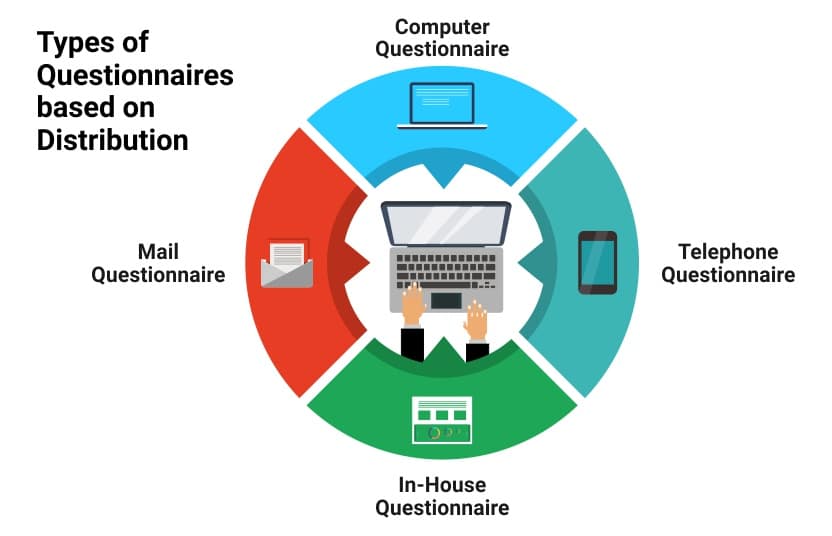
What are the different types of questionnaire
There are following types of questionnaires:Computer questionnaire. Respondents are asked to answer the questionnaire which is sent by mail.Telephone questionnaire.In-house survey.Mail Questionnaire.Open question questionnaires.Multiple choice questions.Dichotomous Questions.Scaling Questions.
What are the main 4 types of survey questionnaires
While there isn't an official book of survey questions or survey taxonomy, I find it helpful to break down survey questions into four classes: open-ended, closed-ended (static), closed-ended (dynamic), and task-based.
What are the 2 types of questionnaire
There are roughly two types of questionnaires, structured and unstructured. A mixture of these both is the quasi-structured questionnaire that is used mostly in social science research. Structured questionnaires include pre-coded questions with well-defined skipping patterns to follow the sequence of questions.
What are the five questionnaire
These 5 basic questions—how, why, who, when, and what—don't get as much attention as the more popular questions you include in your survey. But they should. Take a few minutes to answer these 5 questions before you start writing your survey. Your results will thank you for it.
What are three questionnaire methods
Designing a questionnaire is a complicated process. There are mainly three main types of questionnaires: 1) Mail or self administered questionnaire; 2) Face to face interviews; 3) Telephone Interviews.
What is a Type 3 question
Level 3: Questions that cannot be definitively answered but can be researched and. on which a position can be formed and supported with. scholarly research.
What are the 7 types of surveys
The Most Common Types of SurveysOnline Surveys. Online surveys are one of the most popular types of surveys and for good reason.Paper Surveys.Mail Surveys.Telephone Surveys.In-Person Surveys.Panel Surveys.Focus Group Surveys.
What are the 6 types of survey questions
Types of survey questionsOpen-ended questions.Closed-ended questions.Rating questions.Likert scale questions.Multiple choice questions.Picture choice questions.Demographic questions.
What are the three basic types of questionnaire
Questionnaire are of different types as per Paul: 1)Structured Questionnaire. 2)Unstructured Questionnaire. 3)Open ended Questionnaire. 4)Close ended Questionnaire.
What are the 4 types of survey methods
Types of SurveyOnline surveys: One of the most popular types is an online survey.Paper surveys: As the name suggests, this survey uses the traditional paper and pencil approach.Telephonic Surveys: Researchers conduct these over telephones.One-to-One interviews:
What are the 4 categories of questions
General or Yes/No Questions.Special or Wh-Questions.Choice Questions.Disjunctive or Tag Questions.
What are the 4 types of data collection
The main techniques for gathering data are observation, interviews, questionnaires, schedules, and surveys.
What are the types of questionnaire for qualitative research
There are two types of qualitative questionnaires or research – Ontological and Epistemological.
What are the 4 types of how questions
In this lesson, I will teach you four types of questions that are specific to the word “how”. I will show you basic English question structure with how much , how many , how + adjective , and how + adverb .
What are the 3 different ways to administer questionnaires
Questionnaires can be self-administered or researcher-administered. Self-administered questionnaires can be delivered online or in paper-and-pen formats, in person or through mail.
What are the 3 three main types of question
Factual questions (level one) can be answered explicitly by facts contained in the text. Inferential questions (level two) can be answered through analysis and interpretation of specific parts of the text. Universal questions (level three) are open-ended questions that are raised by ideas in the text.
What are the 3 primary types of questioning
THREE TYPES OF QUESTIONS: 1. Factual 2. Interpretive 3. Evaluative Page 5 FACTUAL QUESTIONS Page 6 FACTUAL QUESTIONS Everyone will eventually agree on the answer.
What are 5 methods of data collection
The main techniques for gathering data are observation, interviews, questionnaires, schedules, and surveys.
What are 5 common data collection instruments
The 5 most common methods for data gathering are, (a) Document reviews (b) Interviews (c) Focus groups (d) Surveys (e) Observation or testing. While each has many possible variations, we will discuss their typical use here. Here are some basic principles to keep in mind when selecting methods.
What are the three types of research questionnaire
Exploratory, descriptive, and causal are the three main types used in survey research. It helps to familiarize yourself with these types before designing your survey research.
What type of research method is a questionnaire
Survey research can use quantitative research strategies (e.g., using questionnaires with numerically rated items), qualitative research strategies (e.g., using open-ended questions), or both strategies (i.e., mixed methods).
What are the 3 main types of questions
THREE TYPES OF QUESTIONS: 1. Factual 2. Interpretive 3. Evaluative Page 5 FACTUAL QUESTIONS Page 6 FACTUAL QUESTIONS Everyone will eventually agree on the answer.
What are the 6 modes of questioning
Here are the six types of questions Socrates posed:Clarifying concepts.Probing assumptions.Probing rationale, reasons and evidence.Questioning viewpoints and perspectives.Probing implications and consequences.Questioning the question.
What are the three kinds of questions used in questionnaires
Fixed-alternative, scale, and open-ended inquiries are all acceptable. Using all 3 sorts of questions, you may elicit particular information and delve further into their opinions regarding the topic of the presentation.
What are the 7 ways to collect data
7 Data Collection Methods Used in Business AnalyticsSurveys. Surveys are physical or digital questionnaires that gather both qualitative and quantitative data from subjects.Transactional Tracking.Interviews and Focus Groups.Observation.Online Tracking.Forms.Social Media Monitoring.


